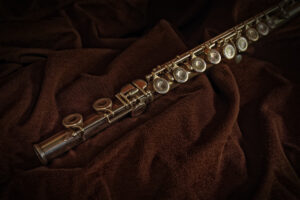Flute Information
You can follow Carolyn Elcock on Flickr Here
Read on for some background flute information so you can make an informed decision as to whether you would like to learn it or not and hence take lessons.
Don’t forget to click on the highlighted words to find out more information on them.
Ask yourself this whilst reading
Do You Want to Learn The Flute?
What is the Flute?
The flute is the highest member of the woodwind family. A flute is a popular, versatile, affordable, long-slender-pipe-like, wind instrument that does not use a reed.
This instrument comes in different sizes from small to large, namely the piccolo, concert flute, alto flute and bass flute.
People generally learn the concert flute first and then can branch out and learn the little piccolo and larger alto and bass options.
Some student flutes have a curved head joint which makes it more comfortable for the younger players.
What Materials is it Made From?
Materials include silver and other metals. Superstar James Galway is known as the “Man With The Golden Flute” as his flute is made of solid gold.
How do you play the Flute?
You play it by blowing across a hole on the headpiece. Different notes are made by covering holes along the main body and foot joint with your fingers or keys.
What sound does the flute produce?
The word flute comes from the Latin verb flare which means to flow. So when the air flows down the instrument, a clear bell-bird like sound with expressive colour is produced. The range of sound over three octaves from low C (middle C on piano) upwards. Some flutes have a special B foot end piece, in which case the lowest note played is B below middle C.
What is a good age to begin?
A good age to begin learning this instrument is around 8 or 9 years when students are big enough to hold it up and spread their fingers over the keys. It is possible to learn earlier than 8 years with the aid of a curved headjoint.
Types of music the flute plays
You play music on the flute using the treble clef.
There are many different styles of music you can enjoy playing ranging from classical, jazz, musical theatre and more.
You can enjoy making friends by joining a musical group or two. These can include chamber groups, flute choirs (using the various sizes of flutes), orchestras, big bands, jazz ensembles. You can also enjoy playing duets with one other person on any instrument or soloing in the comfort of your own home playing your favourite styles, maybe to a backing track on a CD or computer.
Portability
The flute is very portable and can be taken anywhere with ease eg orchestra practice or holiday. Just imagine standing on top of a mountain on a sunny day, looking out at the magnificent scenery and playing your favourite melodies to nature. Wow! Try doing this with a double bass.
How are you going to learn ?
You can teach yourself by purchasing a tutor book locally or online.
or you can
Find yourself a teacher who can recommend a book to learn from.
A first lesson may go something like this:
1. Breathing exercises, to become aware of proper breathing techniques. Some students think the tummy goes in when you breathe in, but it goes out. Think of a balloon getting bigger as air goes into it. As you breath in air goes into the lungs, making them expand and hence moving the tummy out. It is important to get the breathing right in order to create a good sound.
2. Sounds from the head piece alone.
3. Putting the three pieces together.
4. Standing or sitting posture.
5. Getting sounds: Depending on the student there may be time to learn the fingering of the notes B A G and play them. One can try long and short sounds.
Are you prepared to practise?
You must be in good training to play a wind instrument like the flute, just like you need to be in good training for any sport. Your real work is the daily training sessions done by you ie playing and practise and your teacher is the coach.
Are you prepared to look after the flute?
When you learn this instrument it is important to look after it.
Read here to find out how.
Finale
Have you enjoyed learning about the flute?
Would you like to learn it?
If yes, then take a look at the five things you need to start learning it. This includes needing an instrument which you may be able to hire from a music store near you or purchase.
If you would like more information or are interested in Flute Lessons in Rolleston or in Canterbury in one of the schools I teach or online, then please contact me here.
If you would like to book for lessons then please fill in the Enrolment Form Here.
If no, take a look at the recorder, piano or keyboard pages.

